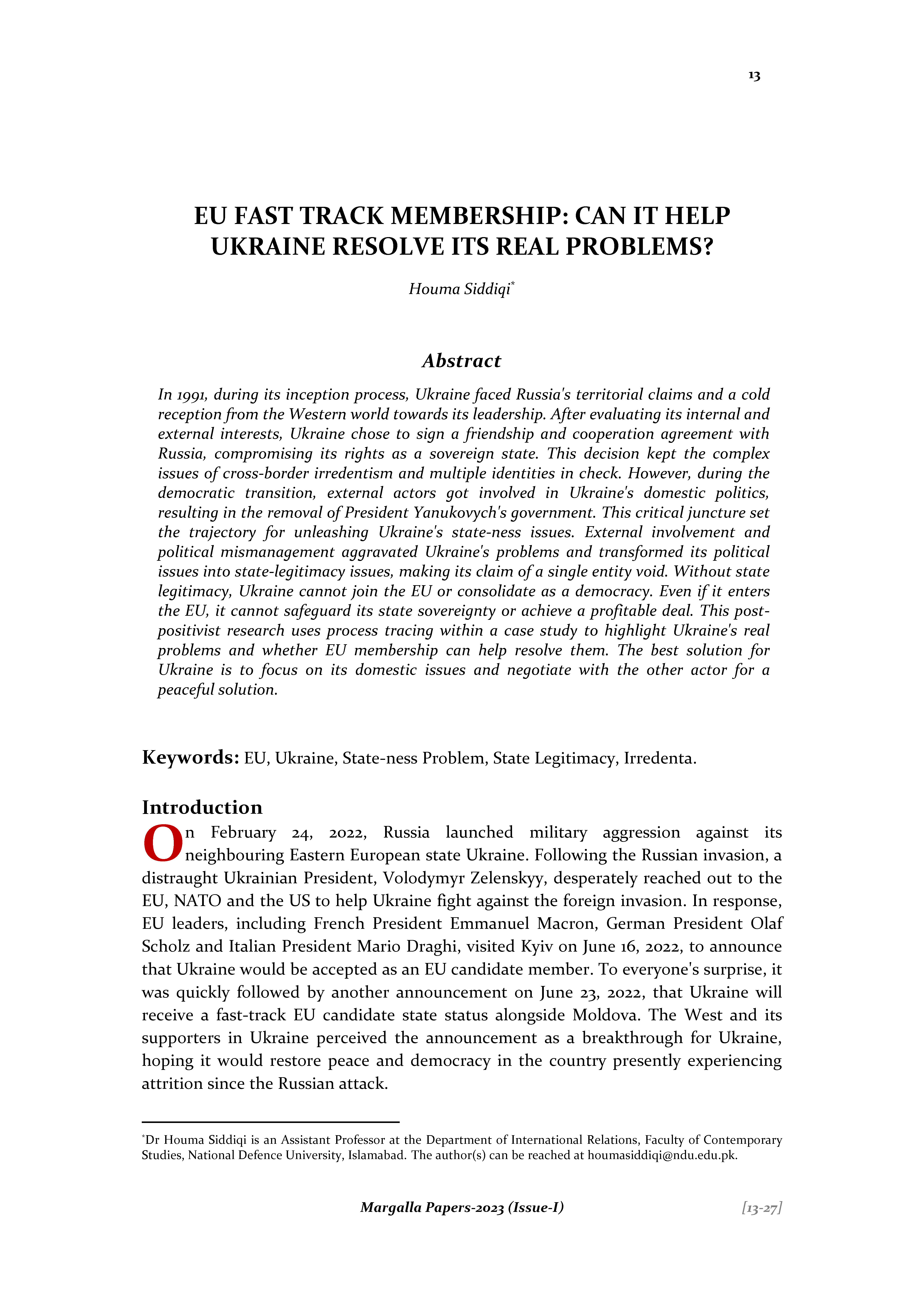EU FAST TRACK MEMBERSHIP: CAN IT HELP UKRAINE RESOLVE ITS REAL PROBLEMS?
DOI:
https://doi.org/10.54690/margallapapers.27.1.148Keywords:
EU, Ukraine, State-ness Problem, State Legitimacy, Irredenta.Abstract
In 1991, during its inception process, Ukraine faced Russia's territorial claims and a cold reception from the Western world towards its leadership. After evaluating its internal and external interests, Ukraine chose to sign a friendship and cooperation agreement with Russia, compromising its rights as a sovereign state. This decision kept the complex issues of cross-border irredentism and multiple identities in check. However, during the democratic transition, external actors got involved in Ukraine's domestic politics, resulting in the removal of President Yanukovych's government. This critical juncture set the trajectory for unleashing Ukraine's state-ness issues. External involvement and political mismanagement aggravated Ukraine's problems and transformed its political issues into state-legitimacy issues, making its claim of a single entity void. Without state legitimacy, Ukraine cannot join the EU or consolidate as a democracy. Even if it enters the EU, it cannot safeguard its state sovereignty or achieve a profitable deal. This post-positivist research uses process tracing within a case study to highlight Ukraine's real problems and whether EU membership can help resolve them. The best solution for Ukraine is to focus on its domestic issues and negotiate with the other actor for a peaceful solution.
Bibliography Entry
Siddiqi, Houma. 2023. "EU Fast Track Membership: Can It Help Ukraine Resolve Its Real Problems?" Margalla Papers 27 (1): 13-27.
References
E. B. Haas. The Uniting of Europe. Notre Dame: University of Notre Dame Press (1958).
J. Linz, and A. Stepan. Problems of Democratic Transition and Consolidation: Southern Europe, South America and Post-Communist Europe. Baltimore and London: John Hopkins University Press (1996).
P. C. Schmitter and J. Santiso. "Three Temporal Dimensions to the Consolidation of Democracy. International Political Science Review." 19(1) 1998. DOI: https://doi.org/10.1177/019251298019001005
E. Newman and G. Z. Visoka. "The European Union’s Practice of State Recognition: Between Norms and Interests." Review of International Studies, 2018. DOI: https://doi.org/10.1017/S0260210518000104
P. D'Anieri. Economic Independence in Ukraine- Russian Relations, Albany, NY: University of New York Press (1995).
J. Snyder. “From Voting to Violence: Democratisation and Nationalist Conflicts.” New York: W.W Norton and Company (2001).
S. D. Krasner. Sovereignty: Organised Hypocrisy. Chichester: Princeton University Press (1995).
G. Knaus and M. Cox. Building Democracy After Conflict: The “Helsinki Moment” in Southeastern Europe. Journal of Democracy 16(1) 2005: p. 39-53. DOI: https://doi.org/10.1353/jod.2005.0010

Downloads
Published
How to Cite
Issue
Section
License
Copyright (c) 2023 Houma Siddiqi

This work is licensed under a Creative Commons Attribution-NonCommercial 4.0 International License.












